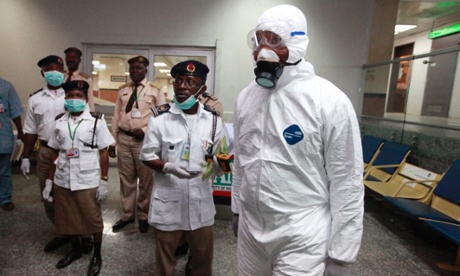Infectious diseases specialists say malaria is still the most likely illness to come from Africa and needs prompt treatment

Leading infectious diseases experts have warned Australian hospital staff not to become so concerned about detecting cases of the Ebola virus that they fail to recognise other concerning, but more common, diseases in their patients.
The Ebola virus outbreak unfolding in West Africa is the largest recorded, with more than 1,700 people known to be infected and numbers continuing to rise. Previously, the largest outbreak was in Sudan in 2000, which affected 425 people.
Concerns about the virus, a type of haemorrhagic fever, prompted the New South Wales department of health to issue information to state emergency departments and clinicians advising them to be on the lookout for cases. The federal health department made similar information available to doctors last month.
A professor of infectious diseases at the Australian National University, Peter Collignon, said Australia was right to take precautions and doctors should be aware of the virus.
“But equally, we need to realise that if our fear overtakes everything then the reality is, we run a risk of people dying because we’re not treating them for other illnesses as quickly as we should be.”
Heightened awareness of Ebola may mean people returning from Africa with malaria may be wrongfully suspected of having Ebola while malaria was overlooked altogether, he said. It could lead to the patient being quarantined as is protocol, and proper treatment being delayed while Ebola was being ruled out.
Malaria, which is spread by mosquitoes, typically has symptoms including high fevers, shaking chills, and flu-like illness, similar to the initial symptoms of Ebola.
“People coming back from Africa are much more likely to have malaria,” said Collignon, who is also a specialist doctor. “We can’t let fear overtake our ability to deliver care but unfortunately, this does sometimes happen when a rare disease outbreak occurs.
“Health professionals are only human and can become overly fearful too, suspecting Ebola too quickly. But people have fevers for a whole range of reasons.”
He said similar fears occurred during the Sars virus outbreak which affected about a dozen countries back in 2003, and Australian health departments braced themselves for cases.
“There were times when medical and nursing staff wouldn’t go near suspected patients, and it happens around the world during epidemics,” he said. “It’s not that staff shouldn’t be cautious, but fear can paralyse individuals and it can also paralyse a health system.”
Even if a case did turn up in Australia, he said the training of hospital staff meant it would not spread far. While Sars is a respiratory disease spread through coughing and sneezing, Ebola is more difficult to spread in countries with strong health systems and hygiene practices because it requires direct contact with the blood, secretions, organs or other bodily fluids of infected people to be transmitted.
He added that Europe was much more likely to see cases of Ebola than Australia, but the illness was yet to appear there either.
Associate professor Allen Cheng from Monash University’s department of epidemiology and preventive medicine said although Ebola was highly unlikely to enter Australia, its rareness and grotesque symptoms, including uncontrollable bleeding, meant it had captured people’s imaginations.
He emphasised that the disease should not be downplayed, but said perspective about risk to Australians was needed.
“People in Australia are interested in it because it’s rare and dramatic and people make movies about this sort of thing,” he said. “But the most likely scenario is not someone coming from overseas with Ebola, but malaria.
“We do need to make sure that everyone isn’t so panicked about this that they are failing to detect and treat malaria patients.”
The reason the current outbreak was proving more difficult to contain than others was because it had hit West Africa, which had weaker medical resourcing than central Africa, where outbreaks had occurred previously.
It meant health workers and the general community in Guinea, Liberia and Sierra Leone had not been trained to recognise and treat the illness.
Funeral practices in the region, where people touch the deceased, meant the virus was also being spread in that way, Cheng said.
The World Health Organisation began a two-day meeting on Thursday to discuss measures needed to contain the virus.
